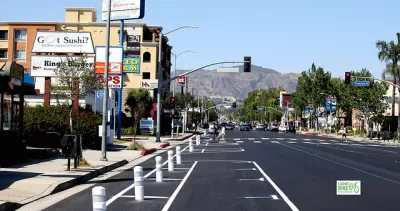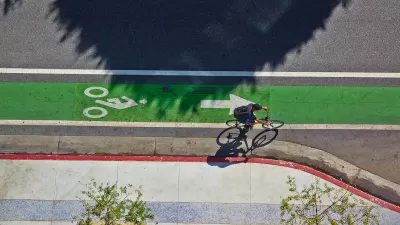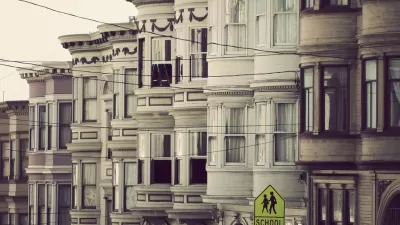The group, Fix The City, sued the city on September 9 on its visionary plan that emphasizes transit, biking, and walking, claiming the traffic lane reductions will create more air pollution, imperil public safety, and add to traffic congestion.

David Zahniser of the Los Angeles Times writes that Fix The City claims that the bold plan to reshape the city's streetscape, with its road diets, bus-only lanes, and protected bike lanes will:
- "Lead to increased tailpipe emissions as drivers confront fewer car lanes and greater traffic congestion.
- "Threaten emergency responders struggling to make their way through traffic."
- Increase congestion for the public, the vast majority of whom will continue to drive their own vehicles and be delayed by the the increased congestion caused by the plan.
- "Nearly 36% of major street segments would be heavily congested in 2035, up from 18% currently, the report said.
- "The same analysis found that if the mobility plan were not approved, the number would reach only 22% in 2035."
The group is suing under the California Environmental Quality Act (CEQA), claiming the city's environmental review and public outreach is insufficient, and that it doesn't abide by the city General Plan. Click here [PDF] to view petition.
Fix The City and other groups that have opposed city land use decisions that increased density have won several cases lately, according to Zahniser:
- "In 2013, they were part of a coalition that succeeded in striking down the Hollywood Community Plan, which sought to allow taller, denser residential towers near transit stops. New environmental documents are being prepared on that plan.
- "In April, a judge overturned the city's approval of the Millennium Project, a pair of skyscrapers planned in Hollywood, saying traffic circulation had not been properly examined.
- "And on Wednesday, a three-judge panel upheld a decision invalidating permits for the 299-unit Sunset and Gordon apartment tower, also in Hollywood."
Fix the City's lawsuit amounts to a "battle for the future of Los Angeles," writes Dennis Romero of L.A. Weekly. "One month ago the L.A. City Council voted to adopt a visionary plan that would guide the transformation of the city from a car-crazed metropolis to one much more dependent on bikes, trains, buses and your feet."
The plan is the new blueprint for L.A.'s so-called Third Wave of growth in which the city is repopulating its core and focusing on more vertical, dense, public transportation–friendly housing and retail
Romero adds that the group "seeks to halt implementation of the plan until it's made consistent with the General Plan and its requirements for public feedback."
FULL STORY: Lawsuit says new L.A. streets plan creates more air pollution, not less

Study: Maui’s Plan to Convert Vacation Rentals to Long-Term Housing Could Cause Nearly $1 Billion Economic Loss
The plan would reduce visitor accommodation by 25,% resulting in 1,900 jobs lost.

North Texas Transit Leaders Tout Benefits of TOD for Growing Region
At a summit focused on transit-oriented development, policymakers discussed how North Texas’ expanded light rail system can serve as a tool for economic growth.

Using Old Oil and Gas Wells for Green Energy Storage
Penn State researchers have found that repurposing abandoned oil and gas wells for geothermal-assisted compressed-air energy storage can boost efficiency, reduce environmental risks, and support clean energy and job transitions.

Private Donations Propel Early Restoration of Palisades Playground
Los Angeles has secured over $1.3 million in private funding to restore the Pacific Palisades playground months ahead of schedule, creating a modern, accessible space that supports community healing after recent wildfires.

From Blight to Benefit: Early Results From California’s Equitable Cleanup Program
The Equitable Community Revitalization Grant (ECRG) program is reshaping brownfield redevelopment by prioritizing projects in low-income and environmental justice communities, emphasizing equity, transparency, and community benefits.

Planting Relief: Tackling Las Vegas Heat One Tree at a Time
Nevada Plants, a Las Vegas-based nonprofit, is combating the city’s extreme urban heat by giving away trees to residents in underserved neighborhoods, promoting shade, sustainability, and community health.
Urban Design for Planners 1: Software Tools
This six-course series explores essential urban design concepts using open source software and equips planners with the tools they need to participate fully in the urban design process.
Planning for Universal Design
Learn the tools for implementing Universal Design in planning regulations.
Ascent Environmental
Borough of Carlisle
Institute for Housing and Urban Development Studies (IHS)
City of Grandview
Harvard GSD Executive Education
Toledo-Lucas County Plan Commissions
Salt Lake City
NYU Wagner Graduate School of Public Service




























